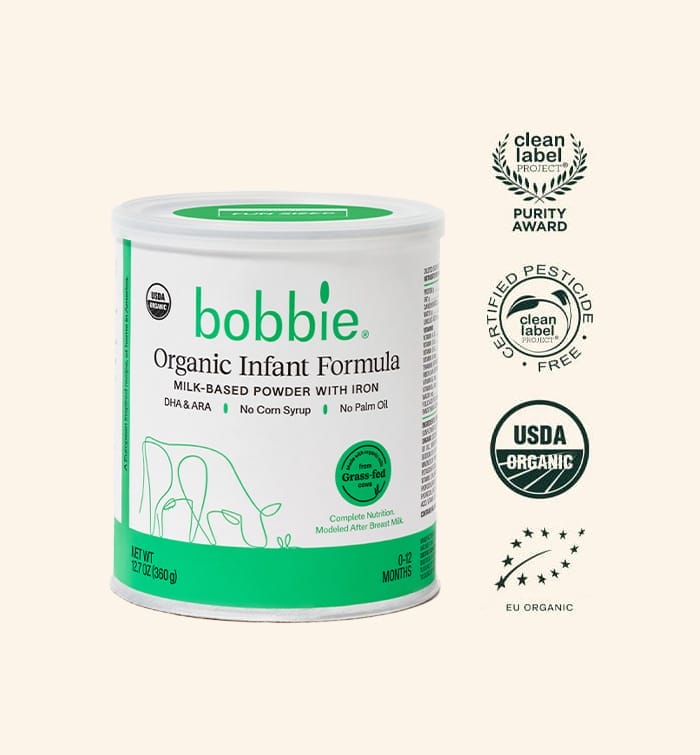We are proud to say that these posts are not sponsored. Our editorial team of Bobbie moms and writers personally select each featured product. If you buy something through our links, we may earn an affiliate commission, at no cost to you.
Let’s start by saying, no parent is a bad parent based solely on whether they choose breast milk or use an organic baby formula. Parents feel so much pressure about making wrong choices, especially new moms and new parents.
Now that we’ve cleared that up, we can safely say that choosing to combo feed or formula feed your baby may be the best decision in several cases. In fact, for some, it may be the only choice.
Yet, new mothers asking if formula feeding makes them a bad mom is not an uncommon question on Google. It’s partly due to stigmas, guilt, or shame of bottle feeding over breastfeeding, staying on maternity leave vs. going back to work, and other decisions that should be a mom and her partner’s choice—but usually get a lot of unasked for feedback from others.
For now, here are a few reasons why formula feeding certainly does not make you a bad mom.
Being a Mom Means More Than Just Breastfeeding
While everyone’s lives seem to be on full display thanks to social media, it is easy to judge ourselves based on what others are saying. Be kind to yourself! Being a good mom is about much more than breastfeeding, and no one should self-critique based on milk supply.
Here are a few things to keep in mind when considering formula feeding:
- This feeding period is only a short time in a baby’s life. Although it is critical, there is much more to come.
- No matter what, you will feed your baby from day one.
- Giving your baby love and affection matters just as much as what you put in their stomach.
- Some people become moms after the breastfeeding stage has long passed.
- You can and will bond with your baby regardless of how you choose to feed.
Your Happiness and Comfort Matters, Too
As a mom, it’s important to acknowledge that your mental health and comfort matter. If you are unhappy or feel uncomfortable, it can impact your relationship with your baby.
Moms should be encouraged to care for themselves because a healthy, happy mom can only lead to good things for their babies. Don’t sacrifice your happiness or comfort due to fears that are based on worry more than fact.
Yes, for some, “breast is best” really is true. But, what is true in one circumstance may not be true in others.
Medical Situations and Life Scenarios
Being a mom is not as narrow or simple as some will have us believe. There are many reasons that exclusive breastfeeding really is impossible for mothers, making formula feeding the correct and only choice.
Mothers and Parents Who Did Not “Carry” Their Babies
Many moms did not and perhaps cannot “carry” their babies in the traditional sense, namely, pregnancy. These mothers don’t have enough milk to breastfeed, and the formula is their best or only way to provide nutrition to their newborns.
Mothers With Underlying Health Conditions
Some moms may have undergone surgeries or mastectomies, making breastfeeding no longer an option. Of course, this result is unique to each surgery.
Other moms may have underlying health issues (and accompanying medications) that restrict them from breastfeeding or affect their milk production, such as postpartum depression.
Mothers Who are Returning to Work
New moms who are finally returning to work may find it hard to find the time to breastfeed their child, or they may not have the energy to breastfeed after a long day at the office.
Formula feeding your baby in order to make sure they are still getting all the nutrients they need while you get the job done at work is a great way to maintain your child’s health, and you should not be ashamed of working hard.
Everyone, Especially Mom, Needs a Little Help Sometimes
Breastfeeding can be a lot of work, and it can make moms feel as if they are the only caretaker of their babies. It doesn’t have to be this way, and moms should not feel guilty about needing help. When it comes to motherhood, Bobbie® believes in non-judgment and supports all moms and their uniqueness.
For couples, formula feeding opens up the possibility of equal partnership where moms can share feeding responsibilities with their partners or family members. It also gives room for mom to take a break, relax, or even go back to work without having to worry about a breast pump.
Using an organic formula for newborns will also present more opportunities for breaks and self-care in their schedules for single mamas. It allows grandparents or other relatives to help with caring for the baby should mom need time for herself.

Shop Bobbie Organic Infant Formula
Bobbie Organic Infant Formula is a USDA Organic, EU-style infant formula that meets all FDA requirements. It is a complete nutrition milk-based powder modeled after breast milk and is easy on tummies. It is non-GMO and doesn't have corn syrup, palm oil, or maltodextrin. Learn more about Bobbie.
Formula Feeding Is More Common Than Most Will Admit
In a 2018 breastfeeding study, the CDC reported 83.2 percent of babies born in 2015 were breastfed within the first weeks following birth. However, only 46.9 percent were exclusively breastfed at three months. This statistic means that over 50 percent of moms were formula feeders by some point within their first year, whether exclusively or in combination feeding.
By six months, the statistics are even lower, with only 25 percent of moms exclusively breastfeeding. Those aren’t the only statistics; the vast majority of infants in the United States are fed formula or other milk substitutes for their mother’s milk past six months of age.
These statistics show that although many may tout the benefits of breastfeeding or say that “breast is best,” it does not mean that breast is “only.” Supplementing breastmilk with formula is a reality that many moms accept and practice. Infant formula includes essential vitamins and nutrients, which is why so many moms feed their baby formula.
Plus, formula feeding doesn’t necessarily expose your baby to more feeding risks than other feeding options.
Does Formula Feeding Increase My Baby’s Chance of Getting a Stomach Bug?
All babies can get a stomach bug, whether they are exclusively breastfeeding, exclusively formula feeding, or combining the two. They can be exposed at daycare or through contact with other children, changes in diet, medications, and even teething.
Breastfed babies can be sensitive to foods in the mother’s diet, and formula-fed babies can have allergies to certain infant formulas or ingredients like soy protein that can cause nausea, diarrhea, and other allergy symptoms.
There can also be contamination with infant formulas during the manufacturing process, germs in the water used to prepare, or issues with formula storage. There is no straight answer to a stomach bug!
Closing, Why Formula Feeding is Not a Bad Choice
No two situations are alike, and what may be best for one mother may not be best for another. Let’s not judge others based strictly on opinions of what we believe, but instead share facts and allow parents to make their own choices.
What you feed your happy babies matters, no doubt. Whether you decide to breastfeed, combo feed or formula feed, that choice is yours to make. So, does formula feeding make you a bad mom? Absolutely not.
Don’t let the pressure of a new baby or first child get to you—you’re doing a great job, we promise. The most important thing is doing what you can to ensure your baby gets the health benefits they need.
As always, don’t be shy to reach out to a lactation consultant or pediatrician if you want additional guidance on what’s best for you and your baby.

Shop Bobbie Organic Infant Formula
Bobbie Organic Infant Formula is a USDA Organic, EU-style infant formula that meets all FDA requirements. It is a complete nutrition milk-based powder modeled after breast milk and is easy on tummies. It is non-GMO and doesn't have corn syrup, palm oil, or maltodextrin. Learn more about Bobbie.
Sources:
Infant feeding, poverty, and human development | NCBI
CDC Releases 2018 Breastfeeding Report Card | CDC Online Newsroom | CDC
Comparing Infant Formulas with Human Milk – Infant Formula | NCBI
Acceptable medical reasons for use of breast-milk substitutes | NCBI.
Infant Allergies and Food Sensitivities | Health Children.org

